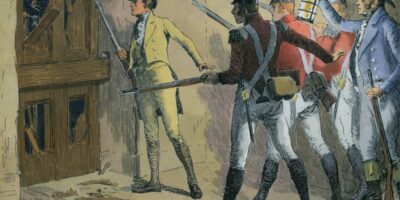The Passing of Esteemed Economist Walter Williams

From an African-American single mother household in a housing project in Philadelphia to the halls of UCLA, to a seat at the table with President Ronald Reagan and finally a distinguished professor of economics at George Mason University, a life well-lived is putting it lightly. This has been the journey of Professor Walter Williams, who was born on March 31, 1936 and has now passed away on December 2nd, 2020. Walter Williams was a man who contributed monumentally to the education of countless economists, including some here at AIER, and the advancement of individual liberty.
Although Williams will undoubtedly be remembered in history as a great economist and educator, his path to destiny was full of twists and turns. In his autobiography, Up From the Projects, he discusses many of the challenges he faced growing up in mid-20th century America. Williams would overcome a number of challenges before starting his undergraduate education, such as the overt racism of Jim Crow, a military draft, and the general challenges of his upbringing. After graduating high school, he would move to live with his father and attend Los Angeles City College for only a semester before returning to Philadelphia to work as a taxi cab driver. In 1959, he was drafted as a private into the US Army where he would make the first of his many historical contributions to the ideas of individual freedom.
While stationed in the American South, Williams would make a number of provocative statements challenging racism that resulted in a court martial order against him. After winning the case in his favor he was transferred to Korea where he would write what would be one of many enduring statements regarding individual dignity. The Reason Foundation writes
“On May 29, 1963, Private Walter E. Williams of the U.S. Army’s 30th Infantry Division wrote a letter to President John F. Kennedy denouncing the pervasive racism of the American government and military. “Should Negroes be relieved of their service obligation or continue defending and dying for empty promises of freedom and equality,” Williams demanded of the president. “Or should we demand human rights as our Founding Fathers did at the risk of being called extremists….I contend that we relieve ourselves of oppression in a manner that is in keeping with the great heritage of our nation.”
Such a statement would serve as a precursor to the many books he would write that framed anti-racism through the lens of individual liberty and capitalism rather than the more common Marxist framework. Such books include The State Against Blacks (1984), South Africa’s War Against Capitalism (1989), and Race and Economics: How Much Can Be Blamed on Discrimination (2011). In his book, All It Takes Is Guts (2011) he remarked
“But let me offer you my definition of social justice: I keep what I earn and you keep what you earn. Do you disagree? Well then tell me how much of what I earn belongs to you – and why?”
Throughout his life, Williams would write over a dozen books and author over 150 publications that have appeared in newspapers and academic journals.
After his service in the military, Williams would go on to receive his B.A. in economics from California State University, Los Angeles and then go on to complete his M.A. and Ph.D. from UCLA. He then served on the faculty at a number of schools, finally finding a home as the John M. Olin Distinguished Professor of Economics at George Mason University, where he would also serve as the department chairman from 1995-2001.
Alongside being a member of the Mont Pelerin Society and the American Economic Association, his website states that
“Dr. Williams has received numerous fellowships and awards including: the 2017 Bradley Prize from the Lynde and Harry Bradley Foundation, the Fund for American Studies David Jones Lifetime Achievement Award, Foundation for Economic Education Adam Smith Award, Hoover Institution National Fellow, Ford Foundation Fellow, Valley Forge Freedoms Foundation George Washington Medal of Honor, Veterans of Foreign Wars U.S. News Media Award, Adam Smith Award, California State University Distinguished Alumnus Award, George Mason University Faculty Member of the Year, and Alpha Kappa Psi Award.”
It also goes without saying that Williams has done the world a tremendous service by educating multiple generations of economists who have passed on that knowledge to subsequent ones. His books and writings have enlightened countless people and inspired conversations around the power of markets, the importance of freedom, and opened up new avenues in the way we think about social justice.
Alongside being a prolific academic he was also a popular media personality as his website details that,
“He has made scores of radio and television appearances which include “Nightline,” “Firing Line,” “Face the Nation,” Milton Friedman’s “Free To Choose,” “Crossfire,” “MacNeil/Lehrer,” “Wall Street Week” and he was a regular commentator for “Nightly Business Report.” He is also occasional substitute host for the “Rush Limbaugh” show. In addition Dr. Williams writes a nationally syndicated weekly column that is carried by approximately 140 newspapers and several websites. His most recent documentary is “Suffer No Fools,” shown on PBS stations Fall/Spring 2014/2015, based on Up from the Projects: An Autobiography.”
This is a man who did not confine himself to the halls of academia. He was one that could capture the attention of the American public to bring the ideas of capitalism, limited government, and prosperity out of the textbook and into kitchen table conversations.
In his latest and last book, American Contempt for Liberty (2015) he leaves us all with a quote that could very much serve as parting words of warning for a country that seems to be losing its way. He wrote,
“Do-gooders fail to realize that most good is not done in the name of good but done in the name of self-interest.”
Today, now more than ever, it is men like Walter Williams who are sorely needed to protect the ideas of freedom and prosperity. His work and efforts have educated countless people from the latest generation of economic thinkers to the average citizen who are now better equipped to understand the world around them.
Perhaps it was his intention that through his tireless efforts he will have inspired countless more to pick up where he left off. If that was the case, I think he would be pleased to know he has succeeded.











